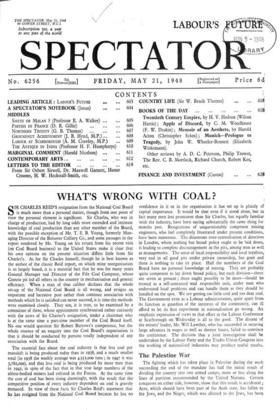WHAT'S WRONG WITH COAL ?
SIR CHARLES REID'S resignation from the National Coal Board is much more than a personal matter, though from one point of view the personal element is significant. Sir Charles, who was in charge of production, had by long odds more extended and intimate knowledge of coal production than any other member of the Board, with the possible exception of Mr. T. E. B. Young, formerly Man- aging Director of the Bolsover Colliery Co., and some passages in the report rendered by Mr. Young on his return from his recent visit (on Coal Board business) to the United States make it clear that his own opinion on the present situation differs little from Sir Charles's. As for Sir Charles himself, though he is best known as the author of the classic Reid report, on which mine reorganisation is so largely based, it is a material fact that he was for many years General Manager and Director of the Fife Coal Company, whose Comrie pit led all others in the country in mechanisation and general efficiency. When a man of that calibre declares that the whole set-up of the National Coal Board is all wrong, and resigns an important and lucrative post rather than continue association with methods which he is satisfied can never succeed, it is time the methods were examined closely. They are, it is true, to be examined by a committee of three, whose appointment synchronised rather curiously with the news of Sir Charles's resignation, under a chairman who is at the same time a part-time member of the Coal Board itself. No one would question Sir Robert Burrows's competence, but the whole essence of an enquiry into the Coal Board's organisation is that it should be conducted by persons totally independent of any association with the Board.
The essential fact about the coal industry is that less coal per manshift is being produced today than in 1938, and a much smaller total (in 1938 the weekly average was 4,353,000 tons ; in 1947 it was 3,782,000), and that less coal is being produced by more men than in 1942, in spite of the fact that in that year large numbers of the ablest-bodied miners had enlisted in the Forces. At the same time the cost of coal has been rising alarmingly, with the result that the competitive position of every industry dependent on coal is gravely menaced. In view of these facts Sir Charles Reid's statement that he has resigned from the National Coal Board because he has no confidence in it or in the organisation it has set up is plainly of capital importance. It would be that even if it stood alone, but in fact many men less prominent than Sir Charles, but equally familiar with the industry, have been saying substantially the same thing for months past. Resignations of unquestionably competent mining engineers, who feel completely frustrated under present conditions, have been numerous. The disastrous over-centralisation of direction in London, where nothing but broad policy ought to be laid down, is leading to complete discouragement in the pits, among men as well as managements. The sense of local responsibility and local loyalties, very real in all good pits under private ownership, has gone and there is nothing to take its place. Half the members of the Coal Board have no personal knowledge of mining. They are probably quite competent to lay down broad policy, but each division—there are seven at present ; there ought possibly to be more—should be treated as a self-contained and responsible unit, under men who understand local problems and can handle them as they should be handled on the spot. We are getting too little coal and too dear coal. The Government even as a Labour administration, quite apart from its function as guardian of the interests of the community, can ill afford to let its first experiment in nationalisation go wrong. An emphatic expression of views to that effect at the Labour Conference at Scarborough on Wednesday is all to the good. The dissent of the miners' leader, Mr. Will Lawther, who has succeeded in securing large advances in wages as well as shorter hours, failed to convince the conference. The decision that a joint investigation shall be undertaken by the Labour Party and the Trades Union Congress into the working of nationalised industries may produce useful results.


































